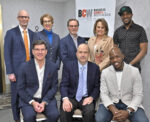by Zachary Vasile
British insurtech building what it calls an easier, more intuitive consumer insurance experience is setting down roots in Hartford, a venture the firm’s co-founder described as a natural next step as his team looks for new opportunities in the U.S.
“Symbolically, Hartford is seen as the home of U.S. insurance,” said Niall Barton, executive chairman of London-based Wrisk. “It’s seen as a very influential place, it’s a hub. So [setting up there] seemed logical.”
Wrisk recently announced plans for its first American office, and Barton said the company is still in the early stages of finding a site for its workers in Connecticut’s Capital City. The plan for now is to set up a temporary base in the “Boat Building” on Constitution Plaza in downtown until a permanent location is secured.
Barton anticipates there will be between 10 to 20 employees based in Hartford by the end of next year, a sizable unit for an organization with about 40 workers total.
Wrisk offers companies a customizable platform they can deploy to help clients evaluate and manage their insurance needs. The mobile-first technology originally centered on “content” insurance — insurance for certain high-value personal possessions — but has since been embraced by players in the automotive world, and company officials hope to expand in that same sector in the U.S. while also branching out into other industries.
“The U.S. is the prize,” Barton said. “We feel we can enter a market where nothing has changed in a while and bring in a platform that makes insurance frictionless.”
Emphasis on experimentation
Barton co-founded Wrisk with Chief Product Officer Darius Kumana in 2015.
The firm got a big boost early on from a partnership with BMW. Wrisk was selected to participate in the German automaker’s business incubator program, and that collaboration led to Wrisk becoming the sole supplier of BMW and MINI car insurance in the U.K.
The partnership gives Wrisk access to reams of data on customer behavior and preferences, which are used to continuously improve and refine the purchasing experience.
Wrisk has also played with ways to make BMW’s platform easier to use and more attractive for potential buyers, including rolling out periods of free coverage.
That approach is encouraged by the regulatory environment in the United Kingdom, Barton said, where insurers are typically freer to experiment than in the tightly-controlled U.S., and where institutions such as the venerable Lloyds have taken the global lead in rolling out novel and innovative insurance products.
“The British insurance industry is pretty advanced,” he added. “We have regulators that are very good and very receptive to new ideas. London is a fertile and friendly place for insurtech.”
The onset of the COVID-19 pandemic in 2020 was “painful” for the business, Barton said, but the health crisis ultimately helped popularize Wrisk’s offerings by pushing consumers toward digital interfaces.
People emerged better versed in how to navigate online ordering systems and digital appointments, and the idea of buying or evaluating insurance online using similar technology no longer seemed foreign or too complicated to pursue.
“BMW was concerned about the conservatism of some of its clients,” Barton said, noting the average age of a typical BMW buyer in the U.K. “But it turned out 70-year-olds were happy to do it and use those services.”
With the company still so new, Barton admits he and his team “still feel every bump in the road,” including pandemic-induced price fluctuations and semiconductor shortages. But Wrisk has continued to build momentum, he noted.
Wrisk completed its Series A fundraising round in 2021, bringing in about $5.9 million. The firm plans to carry out its Series B in the latter half of this year, and a portion of that investment will support the Hartford operations launch.
Trans-Atlantic partnership
Another factor drawing Wrisk to Hartford was the March launch of an “insurtech corridor” between Connecticut and Britain.
Various industry promotional groups and officials from both governments signed an agreement removing certain jurisdictional barriers to cooperation and expansion, intended to help British insurance-technology companies do business in Connecticut, and vice-versa.
The British government said it was interested in forging closer connections with the Greater Hartford region specifically because it is home to numerous insurance and finance firms, including Aetna, Conning, The Hartford, Travelers Cos. and Nassau Financial Group.
Barton is a co-founder of a British trade group involved in the deal, Insurtech UK, and said the arrangement will help stimulate an exchange of knowledge and ideas between each country’s insurtech sector.
Calling the corridor a “natural Atlantic partnership,” Barton said the Hartford region has the depth of experience needed to make it an attractive landing point for British startups.
Reaching out toward Connecticut also makes more sense than venturing into the European Union, he said, as the company would be faced with navigating multiple new languages, while regulators and potential partners in America all speak English.
With time, Barton expects British companies beyond his own to test the waters in Hartford, and he believes American insurers that want to do the same in Britain will get a friendly reception in London.
“You won’t get an avalanche, but there will be some,” he said. “There are a few companies I can think of that must be thinking about opening in America. And, over time, I think you’ll see Hartford start to become a magnet.”
For more information: https://www.hartfordbusiness.com/article/seeking-foothold-in-us-market-british-insurtech-sets-sights-on-hartford
 NASSAU REIMAGINE
NASSAU REIMAGINE








